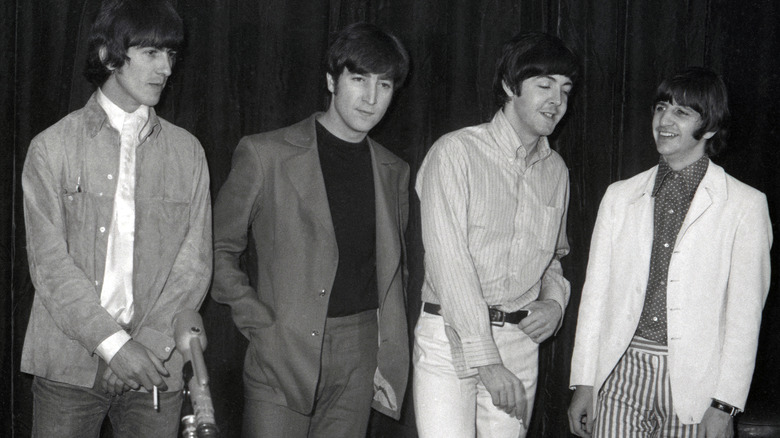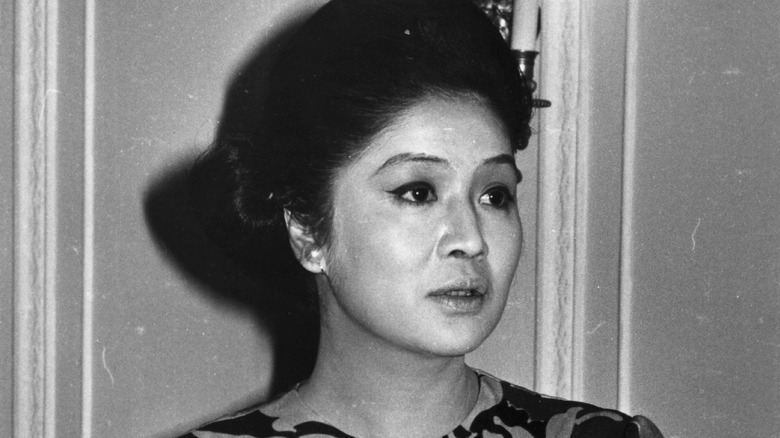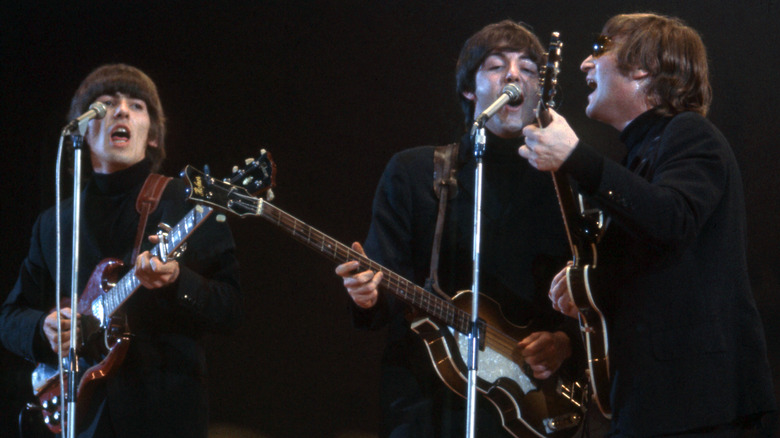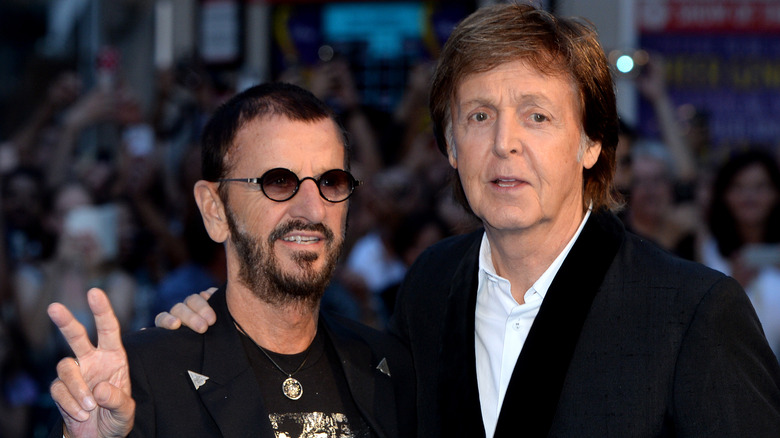The Real Reason The Beatles Snubbed The First Lady Of The Philippines
On August 29, 1966, the Beatles played their last contracted concert at San Francisco's Candlestick Park, making the decision to stop performing live at a time when their records were still selling like hotcakes. Normally, it would boggle the mind as to why an extremely popular band made up of young men in their early-to-mid-20s would leave the touring life behind, but the Fab Four had many good reasons to do so. Playing concerts where their instruments were drowned out by the wails of screaming fans was no longer as fun as it used to be, and the furor over John Lennon's "bigger than Jesus" interview had turned them into pariahs in many parts of the world (via Rolling Stone). The boys wanted to keep making music, but they wanted to keep evolving creatively as a band, and those hectic touring schedules were cramping their style.
Then you had probably the most infamous moment in the Beatles' entire history as a touring act — an ill-fated trip to Manila, Philippines, in the first week of July 1966 that saw them vilified by supporters of President Ferdinand Marcos over an unintentional snub of his wife, Imelda Marcos. It's debatable to call this the last straw for a band that was getting increasingly stressed out by the trials and tribulations of rock stardom. But given how the Marcoses have significantly reentered the political conversation as the country prepares for its upcoming presidential election in 2022 (via Rappler), we should probably look back at the real reason why the Beatles snubbed the Philippine first lady and enraged a nation that had initially welcomed them as heroes.
A not-so-simple misunderstanding ... and plain old fatigue
When the Beatles landed at Manila International Airport (now the Ninoy Aquino International Airport) on July 3, 1966, they were treated as gods among men. That didn't seem like much of a consolation, as Ringo Starr notably recalled feeling uncomfortable upon his arrival. "I hated the Philippines," the drummer said in "The Beatles Anthology," as quoted by Beatles Bible. "We arrived there with thousands upon thousands of kids, with hundreds upon hundreds of policemen -– and it was a little dodgy."
After wining and dining at a private yacht with Manila's elite, the Beatles returned to the Manila Hotel at around 4 a.m. on July 4. Feeling tired from the flight and the party, all they probably wanted to do was to get some rest ahead of a pair of shows at the Rizal Memorial Stadium later that day. However, the Beatles weren't informed beforehand that they were invited by first lady Imelda Marcos to a reception at Malacañang Palace — the Philippine equivalent of the White House — at 11 a.m. And it wasn't like the group enjoyed schmoozing with politicians anyway.
The language used by promoter Ramon Ramos Jr. to inform the Beatles' party about the invitation further muddled things up, as the band's press officer, Tony Barrow, wrote in his book "John, Paul, George, Ringo & Me" that the invite sounded more like a "casual proposal" than an order.
The Beatles arrived as heroes and departed as villains
Much like a head coach who cuts players who miss "voluntary" workouts, Ferdinand Marcos apparently didn't take kindly to foreign celebrities who missed "casual" gatherings. On the morning of July 4, the Beatles were roused from their sleep by a loud commotion outside their hotel rooms. Per Ultimate Classic Rock, George Harrison related that "there was a lot of panic going on outside" as someone barged into his room and insisted that he and his bandmates should be meeting with the first lady. "They were starting to bang on the door," Paul McCartney added. "'They will come! They must come!' But we were saying, 'Look, just lock the bloody door.' We were used to it: 'It's our day off."
Despite all that, the Beatles stood their ground and stayed at the Manila Hotel, though it wasn't long before strange things started happening. Their calls for room service were ignored, and Starr remembered years later that there was a "horrific TV show" in which Imelda Marcos yelled "They've let me down!" in reference to the Fab Four's snub.
The Beatles went on to play as scheduled, with multiple local bands (or "combos," as they were called in the Philippines) serving as opening acts. Over 80,000 mostly young fans cheered their hearts out for their British heroes, but as far as the local media was concerned, the Beatles were public enemy No. 1. The band was condemned by Philippine publications that focused almost exclusively on their non-appearance at the first lady's reception. To make matters worse, some reports alleged that it was the Beatles themselves who wanted to meet with Imelda, and not the other way around (via Beatles Bible).
The Beatles vowed never to return to the Philippines
Following the snub, manager Brian Epstein attempted to publicly apologize for the Beatles' actions, though mysteriously, the state-controlled TV station where his interview was supposed to air blacked out just as he was about to speak, as recalled by The Vintage News. That bizarre occurrence was nothing compared to the treatment the Beatles and their entourage received as they were preparing to depart from Manila on July 5. Angry mobs tried to push the Beatles around and spit at them as they made their way through the airport, and road manager Mal Evans actually suffered some injuries after he was beaten by the crowd. Not surprisingly, the band swore never to come back to the Philippines in their lifetimes, according to Ultimate Classic Rock.
Fifty-five years later, surviving Beatles Paul McCartney and Ringo Starr are still making good on that promise, as neither man has visited the country again despite their continuing relevance among music fans of all ages. And while Ferdinand and Imelda Marcos' son, 2022 Philippine presidential hopeful Ferdinand "Bongbong" Marcos Jr., claimed in a recent interview that he eventually became friends with the Fab Four (via Esquire Philippines), it's worth noting that this has yet to be corroborated by McCartney, Starr, or anyone close to the Beatles, who continued speaking negatively about their experience in Manila many years after the fact.



